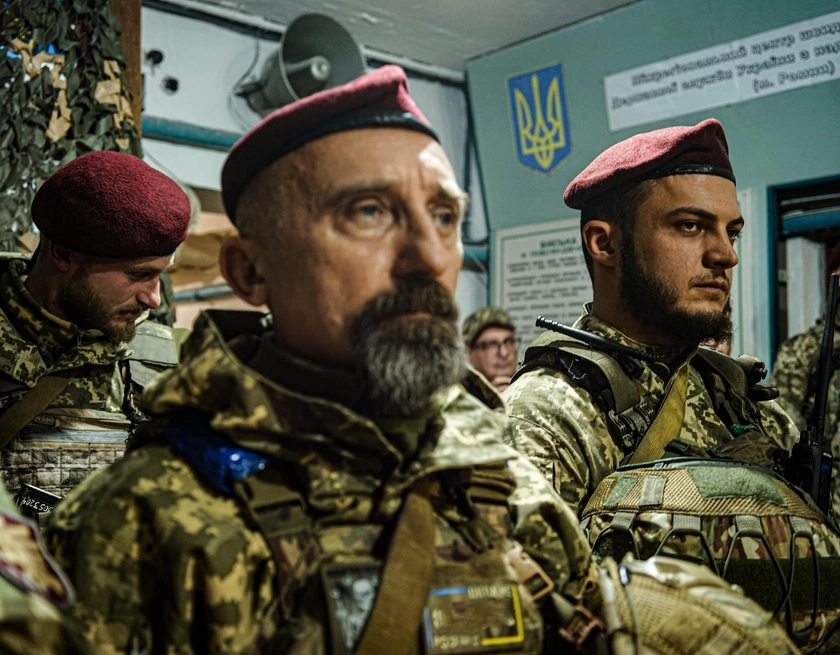Russian dissident Mikhail Kokorich revealed in an interview with the French business magazine Challenges, published on Jan. 30, that his Swiss-based company Destinus had been secretly working on military drones in parallel with its commercial work and providing drones to the Ukrainian armed forces for almost a year.
The 47-year-old Kokorich said that Destinus is “already among the main drone producers in Europe” and “Ukraine is one of our main customers.”
JOIN US ON TELEGRAM
Follow our coverage of the war on the @Kyivpost_official.
Kokorich, the former head of Russia’s space startup Dauria Aerospace, founded Destinus in 2021. He left his native Russia and moved to the US after Vladimir Putin came to power. Notwithstanding his technology background, he increasingly found that his nationality worked against him, so he moved to Switzerland where it was less of a problem.
Destinus was set up ostensibly to design and develop commercial hypersonic cargo and passenger aircraft, demonstrating its first prototype hydrogen-powered hypersonic plane at the Paris airshow last year.
Drones for Ukraine
Kokorich said his company had supplied hundreds of low-cost drones to Ukraine. His factories currently produce three drone models. The UAVs are delivered to Ukraine as separate components for assembly at undisclosed military locations.
The Destinus founder was at pains to point out that these drones were not originally designed as weapons: “All our commercial drone projects are dual-use and not purely military.”
AFU Destroys Another North Korean ‘Koksan’ Artillery in Donetsk Region
The first model produced was the Lord UAV, a propeller-driven intelligence, jamming and electromagnetic interception model also capable of striking ground targets. The Lord has a range of 750 to more than 2,000 kilometers, depending on the version used, which is greater than many of the UAVs available to the Ukrainian forces, such as the Ukrjet UJ-22, UJ-25 Skyline and UJ-26 Beaver, whose maximum ranges are 1,000 kilometers or less.
Two other models are also at various stages of development and will soon go into full production and be provided to Kyiv.
Kokorich said that they started developing Ruta, a dual-role surveillance and air-to-ground attack drone, in the second half of 2023 and that it will be mass-produced from the middle of 2024. It will be produced in Spain and Netherlands and also sent for assembly in Ukraine.
The third model is the Hornet, which is an ultra-fast (300 km/h) drone hunter optimized to map areas and serve as a telecommunications relay which will come on stream by the end of 2024. The manufacturing location for the Hornet has not yet been decided, Kokorich said.
Future business developments
The company has quickly expanded and now employs 170 people with factories in Munich, Madrid and the Netherlands. Since its creation in 2021, it has raised almost €60 million ($65 million) in venture funding and €12 million ($13 million) for research and development of hydrogen powered aircraft engines from the Spanish government.
During the interview he announced two main personnel and business changes he has made to facilitate his support to Ukraine.
Firstly, he formally renounced his Russian nationality at the beginning of the year but was reticent in announcing which country had granted him citizenship, other than to reveal it was a European country. “I have the citizenship of a country to which I am also grateful to have become a citizen. As a private person, I prefer not to reveal further details. I am also grateful to Switzerland and France for allowing me to reside in these wonderful countries.”
He said renouncing his Russian citizenship was primarily a political choice because of his opposition to Putin and the unjustified invasion of Ukraine. He also acknowledged that the decision would allow him to further develop his business in the US.
This week, I deliberately and officially renounced my citizenship of the Russian Federation, ending my formal and only link to the country. As of February 2022, this has been a conscious decision driven by my fundamental disagreement with the Russian invasion of Ukraine and the… pic.twitter.com/MfqhTLZ4lm
— Mikhail Kokorich (@mkokorich) January 14, 2024
Secondly, he confirmed that Destinus was soon to move its headquarters to France, where he will also open another factory. He also disclosed that Destinus had been manufacturing its military drones in factories outside of Switzerland to avoid contravening Swiss controls over military production.
He explained further: “We have had a company in France for almost three years. We are now transferring the functions of the holding headquarters from Switzerland to France. At the same time, we are staying in Switzerland and continuing to develop supersonic and hypersonic technologies there.”
In addition to France’s aeronautical and military expertise, “the ease of obtaining export licenses” is also another attraction. Destinus will carry out its future supersonic tests from Rochefort airport in Charente-Maritime.
You can also highlight the text and press Ctrl + Enter











